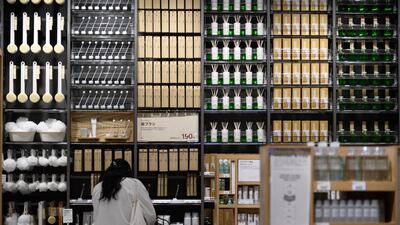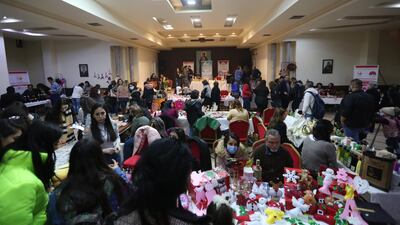Andre Rieu is a 71-year-old Dutch violinist and conductor who created a space for classical music for the masses in an industry marked by shrinking demand, rising cost and financial losses. Rieu's albums have for the past two decades sold more than 40 million copies – versus an average 10,000 copies for more traditional top classical music CDs.
As the Covid-19 pandemic continues to evolve, managers around the world are wondering whether approaches that were successful in the past will still apply to changed business realities. They can learn a lot from Rieu.
Instead of letting existing industry conditions shape his strategy, Rieu reshaped them. He brought in elements such as special lighting, balloons and dove launches, fireworks and even figure skating, thereby creating a new market space and building a multimillion-dollar business with a mass following in the midst of, what we call, a red ocean – a market with existing competition.
In the aftermath of the pandemic, many changes will occur – supply chain restructuring, altered customer preferences, changed government regulations, etc. But one fundamental reality will endure and intensify: companies will face heightened competition. And so, more than ever, firms need to create new demand in order to generate profit and growth.
Rieu's perspective can guide us in a world of mounting challenges. Most organisations are stuck in the trap of competition. Having accepted their industry structure as a given, executives benchmark rivals and focus on outperforming them.
The irony is that the more you focus on outpacing the competition, the more your strategy will look like your competitors.
On the other hand, a blue ocean strategist, instead of imitating competition, focuses on how to make the competition irrelevant. This is the crux of what managers today need to draw inspiration from.
Rieu didn’t imitate other orchestras by holding concerts in expensive venues and hiring world-class soloists and conductors, nor did he adopt a complex and elitist musical repertoire.
Instead, his concerts were held in stadiums and city squares, playing music that was most familiar to average listeners and performing only the bits of classical pieces that speak to the heart, his musicians often dancing, swaying and clapping along with the audience.
He defied industry best practices of conventional orchestras. In doing so, Rieu appealed to a much broader audience who wanted to enjoy the music they loved.
The idea for businesses should be to create an offering so compelling that anyone who sees or tries it can't help but rave about it
The pandemic, by changing people’s working habits and lifestyles, has put many products and services to similar test.
The idea for businesses should be to create an offering so compelling that anyone who sees or tries it can’t help but rave about it.
Stop looking at competition and start looking at what an audience or buyers really value.
Customer satisfaction and understanding customer needs are a priority for any organisation. And most of them monitor customer satisfaction scores through surveys, for example.
This can lead to finer segmentation and greater customisation to meet customers’ specialised needs. But by holding on to a pre-determined definition of who their customers are, organisations are often blind to the wider potential of new demand outside their industry.
In many industries, existing customers are just a drop in the bucket, compared with all the non-customers who can be tapped through market-creating strategies.
Consider Rieu again. While other orchestras focused on devoted classical music lovers, Rieu looked at the mass population of music lovers who were either intimidated or turned off by the heaviness and solemnity of conventional classical concerts.
In a time of sluggish and contracting demand in many industries, fighting for a bigger share of existing customers does not often lead to profitable growth. A blue ocean strategist doesn’t choose between pursuing differentiation and low cost.
Rieu lowered costs by eliminating superstar soloist performances, reducing the size of the orchestra and the complexity of the repertoire. He achieved differentiation by playing familiar tunes, encouraging audience participation and creating a visual and festive grandeur.
The result: Rieu and his orchestra stayed on the Billboard Top 25 Tours list for nearly two decades, along with the likes of Bruce Springsteen and Justin Bieber.
Breaking the value-cost trade-off is particularly important in a post-pandemic world where people, faced with economic uncertainties and living on a tighter budget, tend to be more cautious about their spending and yet more conscious of a product or service’s value and appeal.
Only those offerings that are both differentiated and low cost have the best chance to stand out and open up latent demand, thereby helping restore market confidence and contributing to a speedy economic recovery.
W Chan Kim and Renée Mauborgne are professors of strategy at Insead and Co-Directors of the Insead Blue Ocean Strategy Institute
Milestones on the road to union
1970
October 26: Bahrain withdraws from a proposal to create a federation of nine with the seven Trucial States and Qatar.
December: Ahmed Al Suwaidi visits New York to discuss potential UN membership.
1971
March 1: Alex Douglas Hume, Conservative foreign secretary confirms that Britain will leave the Gulf and “strongly supports” the creation of a Union of Arab Emirates.
July 12: Historic meeting at which Sheikh Zayed and Sheikh Rashid make a binding agreement to create what will become the UAE.
July 18: It is announced that the UAE will be formed from six emirates, with a proposed constitution signed. RAK is not yet part of the agreement.
August 6: The fifth anniversary of Sheikh Zayed becoming Ruler of Abu Dhabi, with official celebrations deferred until later in the year.
August 15: Bahrain becomes independent.
September 3: Qatar becomes independent.
November 23-25: Meeting with Sheikh Zayed and Sheikh Rashid and senior British officials to fix December 2 as date of creation of the UAE.
November 29: At 5.30pm Iranian forces seize the Greater and Lesser Tunbs by force.
November 30: Despite a power sharing agreement, Tehran takes full control of Abu Musa.
November 31: UK officials visit all six participating Emirates to formally end the Trucial States treaties
December 2: 11am, Dubai. New Supreme Council formally elects Sheikh Zayed as President. Treaty of Friendship signed with the UK. 11.30am. Flag raising ceremony at Union House and Al Manhal Palace in Abu Dhabi witnessed by Sheikh Khalifa, then Crown Prince of Abu Dhabi.
December 6: Arab League formally admits the UAE. The first British Ambassador presents his credentials to Sheikh Zayed.
December 9: UAE joins the United Nations.
Citizenship-by-investment programmes
United Kingdom
The UK offers three programmes for residency. The UK Overseas Business Representative Visa lets you open an overseas branch office of your existing company in the country at no extra investment. For the UK Tier 1 Innovator Visa, you are required to invest £50,000 (Dh238,000) into a business. You can also get a UK Tier 1 Investor Visa if you invest £2 million, £5m or £10m (the higher the investment, the sooner you obtain your permanent residency).
All UK residency visas get approved in 90 to 120 days and are valid for 3 years. After 3 years, the applicant can apply for extension of another 2 years. Once they have lived in the UK for a minimum of 6 months every year, they are eligible to apply for permanent residency (called Indefinite Leave to Remain). After one year of ILR, the applicant can apply for UK passport.
The Caribbean
Depending on the country, the investment amount starts from $100,000 (Dh367,250) and can go up to $400,000 in real estate. From the date of purchase, it will take between four to five months to receive a passport.
Portugal
The investment amount ranges from €350,000 to €500,000 (Dh1.5m to Dh2.16m) in real estate. From the date of purchase, it will take a maximum of six months to receive a Golden Visa. Applicants can apply for permanent residency after five years and Portuguese citizenship after six years.
“Among European countries with residency programmes, Portugal has been the most popular because it offers the most cost-effective programme to eventually acquire citizenship of the European Union without ever residing in Portugal,” states Veronica Cotdemiey of Citizenship Invest.
Greece
The real estate investment threshold to acquire residency for Greece is €250,000, making it the cheapest real estate residency visa scheme in Europe. You can apply for residency in four months and citizenship after seven years.
Spain
The real estate investment threshold to acquire residency for Spain is €500,000. You can apply for permanent residency after five years and citizenship after 10 years. It is not necessary to live in Spain to retain and renew the residency visa permit.
Cyprus
Cyprus offers the quickest route to citizenship of a European country in only six months. An investment of €2m in real estate is required, making it the highest priced programme in Europe.
Malta
The Malta citizenship by investment programme is lengthy and investors are required to contribute sums as donations to the Maltese government. The applicant must either contribute at least €650,000 to the National Development & Social Fund. Spouses and children are required to contribute €25,000; unmarried children between 18 and 25 and dependent parents must contribute €50,000 each.
The second step is to make an investment in property of at least €350,000 or enter a property rental contract for at least €16,000 per annum for five years. The third step is to invest at least €150,000 in bonds or shares approved by the Maltese government to be kept for at least five years.
Candidates must commit to a minimum physical presence in Malta before citizenship is granted. While you get residency in two months, you can apply for citizenship after a year.
Egypt
A one-year residency permit can be bought if you purchase property in Egypt worth $100,000. A three-year residency is available for those who invest $200,000 in property, and five years for those who purchase property worth $400,000.
Source: Citizenship Invest and Aqua Properties
UAE currency: the story behind the money in your pockets













